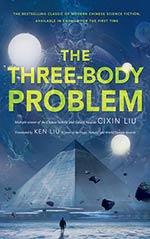
![]() attackofthebooks
attackofthebooks
12/14/2015
![]()
**spoiler alert** China's Cultural Revolution is in full swing. Intellectuals and scientists are denounced by their students for teachings contrary to the communist orthodoxy. The country is in turmoil. No one can be trusted as friends turn on each other, children on their parents, mentors on their students...
Against this backdrop, Ye Wenjie, a young refugee from tumult of the Cultural Revolution will seek peace and escape on a work team in central China cutting down trees. A scientist, her kindness to a colleague is soon betrayed, leading her to death's door and one of the most closely held secrets in China. She comes to loath and hate humanity, losing all faith in the future of the species.
The Three-Body Problem is several stories within stories, with characters taking time out from the plot to dump significant amounts of information in the form of stories told to other characters. The result is occasionally stilted, but not unmanageable, allowing the plot to unfold in an occasionally odd order. It was deep into the book before I could tell what was going on, and I didn't quite figure out who the protagonists and antagonists were until nearly the end. The best and most likable character is a roguish police detective that receives only secondary billing, while the protagonists seem to be driven by forces outside themselves.
Well, maybe not that long. But there's a pervading sense of pessimism about humanity through-out the novel. The Three-Body Problem uses the Cultural Revolution to bring out the absolute worst in people, and against that canvas the discovery of alien life takes on a different tone than I've seen elsewhere. Instead of the typical tropes of human-alien relations. Rather the first contact leads to an almost religious movement to invite alien invasion and domination of humanity.
One of the really interesting aspects of The Three-Body Problem is the sheer number of scientific and technical concepts that Cixin works into the story (if they don't drive the plot altogether). From the physics of three suns in synchronous orbit (a problem that has puzzled scientists since Newton), to microfiber elements, using the sun to magnify radio waves, photons, multidimensional particles, and even massive multiplayer games, The Three-Body Problem is a potpourri of ideas and concepts. It feels a little overdone sometimes, awkward even, and this is where it starts to feel stilted. In some respects, this tone--pessimistic, not dark--sets The Three-Body Problem apart from other science-fiction. Given the backdrop of the Chinese history and the Cultural Revolution, I couldn't tell if the tone was because of the author's perspective on humanity (lost cause) or how he and many Chinese view the world because of their history (in contrast to other cultures, which would, of course, explain why Tor picked it up for publication in English. Tor seems to go all in for anything that isn't white, male or western civilization these days).
It's an interesting and refreshing change of pace in science-fiction to read something that feels so different in tone, and I give credit to Cixin for it. However, The Three-Body Problem is often dry,infodump heavy, and full of awkward structure. I give it credit for being unique, clever, and new, and I will read its sequels, but I hope they can improve upon the ideas of this opening installment in the series.
http://www.attackofthebooks.com/2015-hugo-nominee-the-three-body-problem-by-liu-cixin/